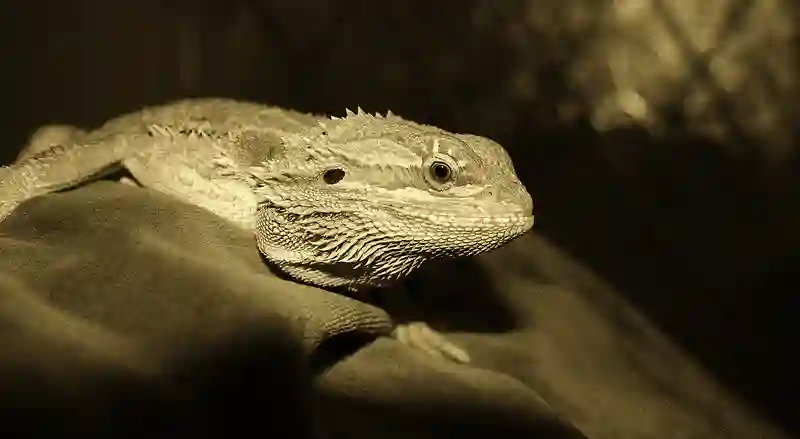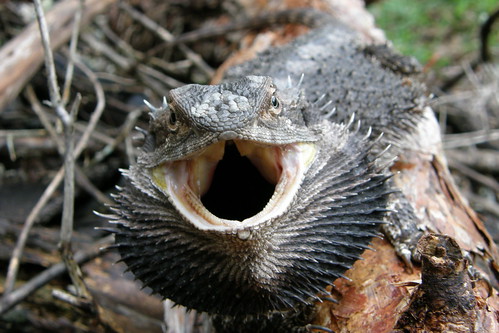Bearded dragons may have blind spots near their noses, so it’s important to observe its behavior to find out if they are actually blind. However, there are some symptoms and signs to watch for that may indicate vision problems or blindness in bearded dragons:
- Unusual eye movements or inability to focus on objects
- Bumping into objects
- Lack of response when a light source is shown
- Difficulty catching food
- Poor coordination when moving around obstacles
- Inability to locate food items that are placed in front of them
- Lack of response to visual stimuli
It’s also possible that your bearded dragon has become accustomed to its blindness and has learned how to adapt and move around despite not being able to see. If this is the case, then some more observation should help you determine whether your reptile is truly sightless.
Signs of blindness in bearded dragons
Signs of blindness in bearded dragons can vary, but there are several common symptoms to look out for:
- Unusual behavior: Blind bearded dragons may display unusual behavior such as pacing, circling, or turning in circles. They may also become more withdrawn or unresponsive.
- Bumping into objects: Blind bearded dragons may bump into objects, such as walls or decorations while walking or moving around their enclosure. This clumsiness is not natural for healthy adult dragons.
- Failure to catch prey: Blind bearded dragons may have difficulty catching live prey, such as crickets, in their enclosure.
- Ignoring objects in front of them: Bearded dragons with vision problems may act as if they cannot see objects directly in front of them.
- Cloudy or discolored eyes: Blindness can be accompanied by cloudy, discolored, or foggy vision in the eyes.
If you suspect that your bearded dragon may be blind, it is important to consult a reptile veterinarian for a proper diagnosis and guidance on how to care for a blind bearded dragon.
Behavioral signs
Blindness in bearded dragons can be identified by observing their behavior and looking for certain signs. Here are some of the behavioral signs that a bearded dragon may be blind:
- Bumping into objects: Blind bearded dragons may bump into objects, such as walls or decorations while walking or moving around their enclosure. This clumsiness is not natural for healthy adult dragons.
- Lack of reaction to visual stimuli: Blind bearded dragons may not respond to visual stimuli, such as movement or changes in light. You can test your bearded dragon’s reaction by shining a bright light directly into its eyes or moving your hand close to its face. The reptile should react even if it’s tired, lethargic, or not in the mood for play.
- Unusual behavior: Blind bearded dragons may display unusual behavior, such as pacing, circling, or turning in circles.
If you suspect that your bearded dragon is blind, you should consult a veterinarian for confirmation and advice on how to care for your pet.
Conducting a test
To conduct a test of a blind bearded dragon, there are several methods suggested by the search results:
- Waving objects in front of them: This is the best way to test if your bearded dragon is blind. You can wave objects like your finger or some type of food in front of them and see if their eyes follow.
- Shining a bright light: You can test your bearded dragon’s reaction by shining a bright light directly into its eyes, but only briefly. However, you don’t want your bearded dragon to become stressed.
- Finger test: The finger test is performed by moving your finger in front of a bearded dragon’s face to see if your finger tracks the movement.
If your bearded dragon is blind, it may exhibit several signs of problems related to their eyes or vision, such as bumping into objects, unusual behavior, and lethargy. If you suspect that your bearded dragon is blind, it is recommended to visit a reptile vet for confirmation of eyesight loss.
Seeking veterinary assistance
If you suspect that your bearded dragon is experiencing vision problems, it’s important to seek veterinary care immediately. A quick visit to a reptile vet should be booked immediately when signs of eye infections become apparent in beardies. The vet may conduct proper examinations to diagnose the problem and prescribe the necessary treatment. Here are some tips on how to care for a blind bearded dragon:
- Feeding: Blind bearded dragons may have difficulties finding their food, even if it is placed in their usual feeding spot. They may also have difficulties locating water and other necessities in their immediate vicinity. Hand-feeding them can help ensure that they are being properly fed and hydrated. Blind bearded dragons can be fed by touching the mouth while standing directly in front of their faces. The next step is to bring the food closer to its mouth and continue tapping it to teach the beardie that you’re ready to offer food. If you’d like for your bearded dragon to keep up some independence, then buy food that can’t move very quickly such as silkworms. This will make it easier for a blind bearded dragon to catch the live food.
- Medication: If the blindness is caused by an underlying condition such as an infection or inflammation, medication may be prescribed to reduce inflammation and manage symptoms.
- Enclosure: Blind bearded dragons may have difficulty navigating their enclosure. It is important to keep the enclosure clean and free of obstacles. Don’t keep moving things around as it can be disorienting for them.
- Regular veterinary check-ups: Schedule regular veterinary check-ups to identify and treat eye problems before they aggravate. A veterinarian can also advise on how to care for a blind bearded dragon.
It is important to note that with proper care and treatment, a bearded dragon can still lead a healthy, happy life even if they have experienced blindness.
Treating blindness in bearded dragons
Bearded dragons can experience blindness due to various factors, including trauma, infection, metabolic bone disease, cataracts, retinal degeneration, eye tumors, and aging. Some of the common causes of blindness in bearded dragons are:
- Eye infections
- Cataracts
- Injuries to the eyes
- Genetic problems
If left untreated, an eye infection can cause permanent damage and even blindness. Cataracts can be treated with surgical removal of the clouded lens, with the goal of restoring the lizard’s vision.
However, if cataracts are left untreated, they could eventually lead to total blindness. Injuries to the eyes can also cause blindness, and it is essential to seek veterinary care immediately if you suspect an injury.
Genetic problems that cause blindness cannot be prevented, but a vet can provide more insight into this aspect. If your bearded dragon is blind, it will not be able to see anything at all, whereas, with cataracts, your bearded dragon will still have some vision, but it will be misty or blurry.
If your bearded dragon is blind, there are some things you can do to help it adjust to its new condition. These include:
- Providing a consistent environment
- Using a shallow water dish
- Providing a hide box
- Using a feeding dish with high sides
- Providing a basking spot with a heat lamp
- Using a UVB light to help regulate the bearded dragon’s circadian rhythm
It is essential to consult with a veterinarian if you suspect that your bearded dragon is experiencing blindness or any other eye problems.
Preventing future blindness
Bearded dragons can experience eye problems that can lead to partial or complete blindness. Here are some tips to prevent future blindness in bearded dragons:
- Keep their enclosure clean: Dirty enclosures can increase the risk of eye infections and numerous other health problems. Clean their enclosure regularly and choose the right substrate to avoid irritation in the eyes.
- Provide proper lighting: Be sure to provide the proper lighting for your bearded dragon to prevent eye problems. A sufficient amount of light is necessary to keep your bearded dragon healthy and powerful.
- Feed a balanced diet: Feeding your bearded dragon a balanced diet with adequate amounts of calcium and vitamin A will also help with prevention.
- Monitor temperature and humidity: Keep an eye on the temperature and humidity of their tank to ensure that they are kept in the best possible circumstances.
- Take them to the vet: If you notice any symptoms of eye infection, take your bearded dragon to the vet to be checked up. An untreated eye infection may lead to permanent damage and possible blindness.
While some instances of blindness in bearded dragons may be due to genetic problems that cannot be prevented, following these tips can help reduce the risk of eye problems and prevent future blindness.
Conclusion
If you think your bearded dragon may be blind, watch for certain signs. It could be hesitating or not knowing its surroundings, like having trouble finding food or water dishes or bumping into objects. It may also not react to visual stimulation.
Observe it over time to see if it shows these signs often. If it does, talk to a reptile vet. They can do a physical check-up and maybe suggest further testing to discover the cause of the blindness.
Although there is no cure, you can make life easier for your dragon. Change the enclosure to stop obstacles and add tactile cues. Use different colors and textures for food and water, so it’s easier for them to find.
Don’t panic if you think your dragon is blind. Make sure they get the help they need by observing their behavior and getting professional help when needed.

